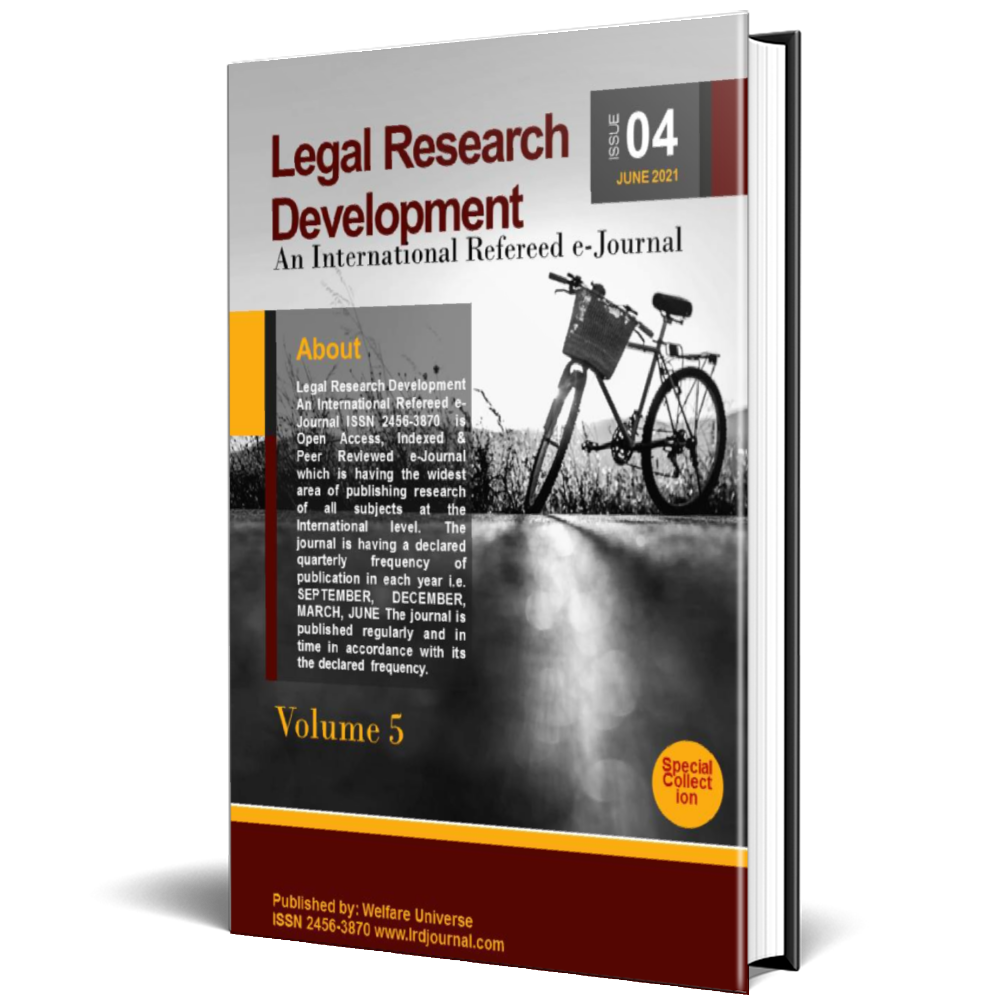Legal Perspectives of Air Espionage in Today’s Globalized Scenario: A Critical Appraisal
DOI:
https://doi.org/10.53724/lrd/v8n1.4Keywords:
Air Espionage, Role of technology, Aid to Air Espionage, Escalating challenges, Air & Space LawsAbstract
Espionage is not the modern-day concept. Rather it has its roots got established since the time immemorial. However, the literal meaning of the term is to peep into the internal affairs of the other nation. This means that it is the absolute violation of the principle of non-interference, which is so stated under Article 2.4 of the UN Charter of 1945. However, this age-old practice is not restricted to any single method for its conduct. Now-a-days there has been several other methods available through which this prohibited act is practiced by any of the nation. Today the territorial distance has no more be the bar to interfere into the sovereignty and integrity of any other nation. The authors by virtue of this research paper will likely to bring on the certain methods through which this restricted act of espionage is practiced under the newly emerging discipline of law, which is Air Laws. Furthermore, this paper will also bring into the limelight the recent trends so followed by the developed nations to spy over the working of the other developed as well as both under developed and developing nations. Such paradigms are the glared matters of the daily headlines. In addition to this, the authors will also be going to reflect through this research paper the various surveillance programmers conducted by the accorded nations to get an access to the confidential information, concerned with any other nation. Last but not the least the authors will try to bring out the nexus between the advancement of the technology has played crucially a two-fold role in snooping as well as curtailing the upsurge of the Air Espionage.
References
Beck, Neil J. “Espionage and the Law of War.” American Intelligence Journal, vol. 29, no. 1, 2011, pp. 126–36. JSTOR, http://www.jstor.org/stable/26201929. Accessed 13 Dec. 2023.
Nowrasteh, Alex. Espionage, Espionage-Related Crimes, and Immigration: A Risk Analysis, 1990–2019. Cato Institute, 2021. JSTOR, http://www.jstor.org/stable/resrep28732. Accessed 13 Dec. 2023.
Lee, Blewett. “Sovereignty of the Air.” The American Journal of International Law, vol. 7, no. 3, 1913, pp. 470–96. JSTOR, https://doi.org/10.2307/2187429. Accessed 13 Dec. 2023.
Smith, Jessica “Zhanna” Malekos. “NO STATE IS AN ISLAND IN CYBERSPACE.” Journal of Law & Cyber Warfare, vol. 5, no. 1, 2016, pp. 4–65. JSTOR, http://www.jstor.org/stable/26441265. Accessed 13 Dec. 2023.
McCoubrey, H. “INTERNATIONAL HUMANITARIAN LAW AND AIR WARFARE.” International Law and Armed Conflict Commentary, vol. 2, no. 1, 1995, pp. 23–48. JSTOR, http://www.jstor.org/stable/44516032. Accessed 13 Dec. 2023.
Corn, Gary P., and Robert Taylor. “SOVEREIGNTY IN THE AGE OF CYBER.” AJIL Unbound, vol. 111, 2017, pp. 207–12. JSTOR, https://www.jstor.org/stable/27003731. Accessed 13 Dec. 2023.
Brown, Gary, and Keira Poellet. “The Customary International Law of Cyberspace.” Strategic Studies Quarterly, vol. 6, no. 3, 2012, pp. 126–45. JSTOR, http://www.jstor.org/stable/26267265. Accessed 13 Dec. 2023.
Lotrionte, Catherine. “Cyber Operations: Conflict Under International Law.” Georgetown Journal of International Affairs, 2012, pp. 15–24. JSTOR, http://www.jstor.org/stable/43134334. Accessed 13 Dec. 2023.
Abdyraeva, Cholpon. “Cyber Warfare.” The Use of Cyberspace in the Context of Hybrid Warfare.: Means, Challenges and Trends, OIIP - Austrian Institute for International Affairs, 2020, pp. 15–20. JSTOR, http://www.jstor.org/stable/resrep25102.7. Accessed 13 Dec. 2023.
Lewis, James A. “ASIA: THE CYBERSECURITY BATTLEGROUND.” Center for Strategic and International Studies (CSIS), 2013. JSTOR, http://www.jstor.org/stable/resrep37585. Accessed 13 Dec. 2023.
Kumar, Ramesh. (2013). Theory of Determination, Violation and Protection of Human Rights. Thematic Journal of Law, 3(1), 20-27.
Verma, Raj, K. & Kumar, Ramesh (2014). A Socio Legal Study: Corruption, Black Money and Law in Indian Democracy. Indian Scholar (An International Multidisciplinary Research e-Journal), 1 (1).
Kumar, Ramesh. (2015). A Critical Appraisal and Philosophical Study of Human Rights Law in Perspective of Specific Indian Dimension: As An Introduction. Jai Maa Saraswati Gyandayini An International Multidisciplinary e Journal, 1(2),10-31.
Kumar, Ramesh. (2016). A Critical Appraisal of Human Rights Law with Special Reference to Constitution of India. Legal Research Development (An International Referred e-Journal), 1(2), 55-64. https://doi.org/10.53724/lrd/v1n2.06
Kumar, Ramesh. (2017). A Critical Appraisal of Law relating to Human Rights with Special Reference to Enforcement System. Legal Research Development (An International Referred e-Journal), 1(3), 63-75. https://doi.org/10.53724/lrd/v1n3.06
Kumar, Ramesh. (2017). The Role of Indian Judiciary with respect to Human Rights Law in India: JMSG (An International Multidisciplinary e- Journal), 2(3), 01-09. https://doi.org 10.53724/jmsg/v2n2.02
Verma, Raj, K. & Kumar, Ramesh (2017). Role of Para- Legal Services in Administration of Justice: An Empirical Study of Ashok Nagar District. Legal Research Development (An International Referred e-Journal), 2 (1). https://doi.org/10.53724/lrd/v2n1.02
Verma, Raj, K. & Kumar, Ramesh (2017). Role of Para- Legal Services in Administration of Justice: An Empirical Study of Gwalior District. Legal Research Development An International Referred e-Journal, 1(3), https://doi.org/10.53724/lrd/v1n4.06
Verma, Raj, K. & Kumar, Ramesh (2017). A Critical Study of Challenges of Para-Legal Services in India. Legal Research Development An International Referred e-Journal, 1 (3). https://doi.org/10.53724/lrd/v1n3.14
Kumar, Ramesh. (2018). A Study of Human Rights Jurisprudence: An Overview. Legal Research Development An International Referred e-Journal. 2 (3), 55-64. https://doi.org/10.53724/lrd/v2n3.03
Kumar, Ramesh. (2019). A Study of Judicial Responses relating to Human Rights in India. Legal Research Development An International Referred e-Journal, 4 (1), https://doi.org/10.53724/lrd/v4n1.06
Kumar, Ramesh. (2022). Meninism and Preconceived Ideology with specific Indian Dimension of Human Rights in Today’s Changing Globalized Scenario: A Critical Appraisal. Legal Research Development, 7 (1), 27-29. https://doi.org/10.53724/lrd/v7n1.10
Kumar, Ramesh. (2022). State Human Rights Commissions as Enforcement System in India: A Critical Appraisal. Research Inspiration, 7 (2),1-17. https://doi.org/10.53724/inspiration/v7n2.02
Kumar, Ramesh. (2022). Human Rights of Men in the World of Globalization-An Essence of Time: A Critical Appraisal: Jai Maa Saraswati Gyandayini An International Multidisciplinary e Journal, 8(2), 1-6. https://doi.org/10.53724/jmsg/v8n2.02
Kumar, Ramesh. (2022). Human Rights of Men in the World of Globalization-An Essence of Time: A Critical Appraisal: Jai Maa Saraswati Gyandayini An International Multidisciplinary e Journal, 8(2), 1-6. https://doi.org/10.53724/jmsg/v8n2.02
Kumar, Ramesh, Verma Kumar, Raj, Verma Kumar, Rohit. (2023). Justice Accessibility in perspective of Juristic Rational Science with Specific Dimension of Medical and Forensic Science: Jai Maa Saraswati Gyandayini An International Multidisciplinary e Journal, 9(1), 10-13. https://doi.org/10.53724/jmsg/v9n1.03
Downloads
Published
How to Cite
Issue
Section
License
Copyright (c) 2024 Legal Research Development

This work is licensed under a Creative Commons Attribution-NonCommercial 4.0 International License.










